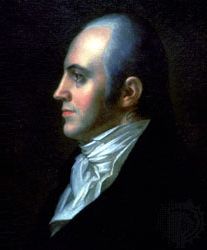Loading AI tools

Aaron Burr, Jr. (6 February 1756 – 14 September 1836) was an American politician and lawyer. He served as the third vice president of the United States during President Thomas Jefferson's first term from 1801 to 1805. Burr's legacy is defined by his famous personal conflict with Alexander Hamilton that culminated in Burr killing Hamilton in the famous Burr–Hamilton duel in 1804.
- The rule of my life is to make business a pleasure and pleasure my business.
- Letter to Pichon, reported in Marshall Brown, Wit and Humor of Bench and Bar (1899), p. 67.
- There is a maxim, 'Never put off till tomorrow what you can do today.' It is a maxim for sluggards. A better reading of it is, 'Never do today what you can as well do tomorrow,' because something may occur to make you regret your premature action.
- Reported in Marshall Brown, Wit and Humor of Bench and Bar (1899), p. 67. Alternately reported as "Never do today what you can put off till tomorrow. Delay may give clearer light as to what is best to be done", reported in Jacob Morton Braude, The Complete Art of Public Speaking (1970), p. 84.
- Law is whatever is boldly asserted and plausibly maintained.
- Reported in Burton Stevenson, Home Book of Proverbs, Maxims and Familiar Phrases (1948).
- On that subject I am coy.
- Last words; Burr was an atheist. His last words were a response to the efforts of his friend, Reverend P.J. Van Pelt, to get Burr to state that there was a God. Reported in Holmes Moss Alexander, Aaron Burr: The Proud Pretender (1937), p. 356.
- The filibuster isn't mentioned anywhere in the Constitution. Instead, it came into being by happenstance: In 1805, Vice President Aaron Burr urged the Senate to eliminate the "motion to proceed"-a standard parliamentary provision that allows a simple majority of any legislature to end debate on a piece of business and call for a vote. (Burr, who seems never to have developed the habit of thinking things through, reportedly considered the rule a waste of time.)
- Barack Obama A Promised Land (2020)
Wikiwand in your browser!
Seamless Wikipedia browsing. On steroids.
Every time you click a link to Wikipedia, Wiktionary or Wikiquote in your browser's search results, it will show the modern Wikiwand interface.
Wikiwand extension is a five stars, simple, with minimum permission required to keep your browsing private, safe and transparent.
